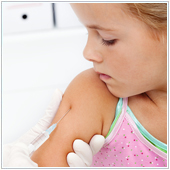 Maybe it’s still hot outside, but the truth is that summer is beginning to wind down and it’s time to start thinking about a new school year. Notebooks, backpacks, pencils and clothing are all important, but what’s even more important is your child’s health. There are many things you can do to prepare for a new school year and keeping up with vaccines that can stop serious diseases and illnesses in their tracks should be at the top of your list.
Maybe it’s still hot outside, but the truth is that summer is beginning to wind down and it’s time to start thinking about a new school year. Notebooks, backpacks, pencils and clothing are all important, but what’s even more important is your child’s health. There are many things you can do to prepare for a new school year and keeping up with vaccines that can stop serious diseases and illnesses in their tracks should be at the top of your list.
National Immunization Awareness Month is the perfect time to remind all of us – adults, teenagers, college students and young children alike – to get caught up on our shots.
Why Should I Immunize?
-
Vaccines can help prevent cancer. According to the National Cancer Institute, the FDA has approved two types of vaccines to prevent cancer, as well as one to treat cancer.
-
By vaccinating, we are protecting our future. According to the CDC, immunizations protect the entire population – our children, grandchildren and their grandchildren – by keeping a disease from spreading. If we continue to vaccinate, the disease will no longer exist and cannot pose a threat to future generations.
-
Vaccines save lives. Babies can be protected from the devastating effects of diseases like measles, tetanus, hepatitis, polio, diphtheria and whooping cough through immunization. By making the decision to immunize, you are saving lives and protecting your child from unnecessary illness and suffering. A study in Colorado found that when compared with their immunized peers, non-immunized children were 6 times more likely to be infected with whooping cough and 22 times more likely to be infected with measles.
7 Tips to Stop Disease In It’s Tracks:
-
Remind your family, friends and coworkers that vaccines aren’t just for kids. An assortment of vaccinations are available and applicable at different phases of life, from infancy to adulthood.
-
Parents with young children should take steps to get the recommended immunizations by age two. Infants are especially susceptible to pertussis (whooping cough), which has seen a rise in recent months, so now is a very important time for preventative vaccinations.
-
It’s important that children, teens and preteens receive all recommended vaccines before returning to school. Not vaccinating can result in exclusion from school, childcare or travel.
-
College students should catch up on immunizations before moving into dormitories.
-
Adults should consult a health professional about necessary vaccines and boosters. While children may be exposed to a plethora of illnesses at school, adults can be exposed to vaccine-preventable diseases doing something as simple as a business trip to another country.
-
Pregnant women should know the options for getting vaccinated to protect newborns from diseases. According to the CDC, staying up to date on vaccines is an important part of a healthy pregnancy.
-
Remember that vaccinations are not only used for serious diseases, but also to prevent common illnesses like the flu. According to flu.gov, you are 60% less likely to need treatment for the flu if you have been vaccinated.
We understand that the idea of getting shots or watching your child get a shot can be nerve wracking, but the benefits of immunizing are huge. As your local healthcare experts, the staff at [company_short] is here to help you by answering all of your vaccination related questions from when to get an immunization to the risks that may be involved. We may even offer a vaccination that you need, so make sure you stop by for more information during Immunization Awareness Month.